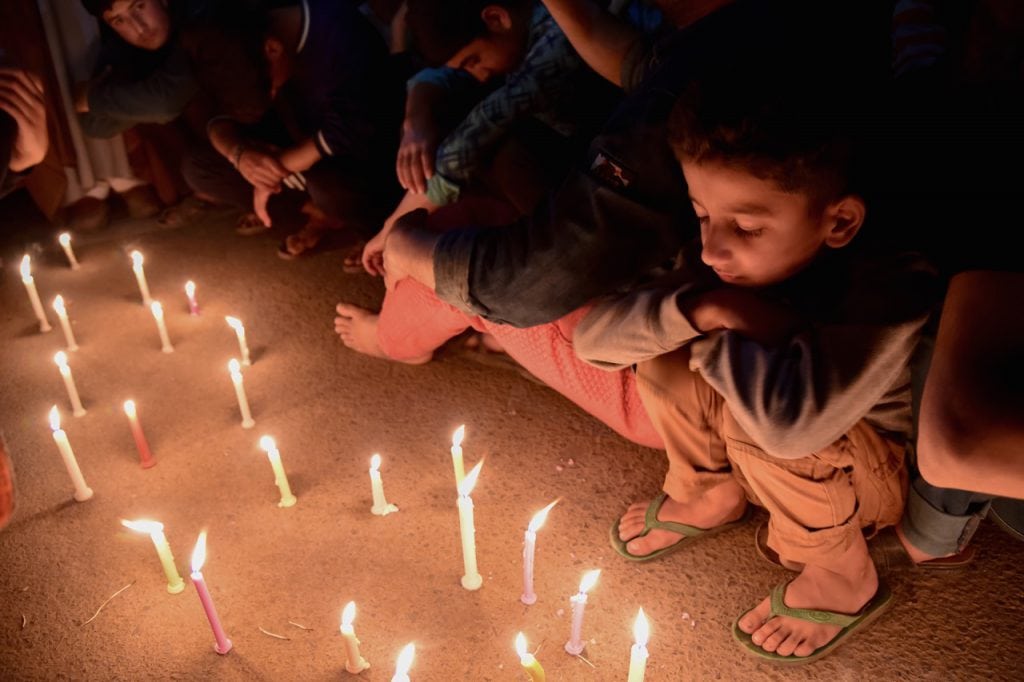April in the Middle East and North Africa: A roundup of key free expression news, based on IFEX member reports.
The government of Saudi Arabia executed 37 citizens, mostly protesters from Shia backgrounds, on 23 April 2019. The victims’ families weren’t even notified, according to the Gulf Center for Human Rights (GCHR). As has become common throughout the region, the Saudi government used the excuse of terrorism, betraying the public image of reform pushed by Mohammad Bin Salman and his government.
As Americans for Democracy and Human Rights in Bahrain (ADHRB) noted, 16 of these men had been the subjects of communications from UN bodies, and the UN High Commissioner for Human Rights, Michelle Bachelet, condemned the government’s decision to execute them.
Among those executed were two of ADHRB’s Profiles in Persecution: Abbas al-Hassan and Munir Al Adam. Al-Hassan was a father of four who was arrested in June of 2013 and held incommunicado for three months. The government had accused him of “spreading the Shia faith”. He was tortured into a confession which was then used against him on 6 December 2016 when the Specialized Criminal Court in Riyadh sentenced him and 14 of the other men to death. This was upheld by the Appeals Court in July 2017.
As for Al Adam, he was arrested under similar circumstances. On 8 April 2012, authorities arrested him at a checkpoint, beat him up, and transfered him to solitary confinement. He was denied medical council, and permanently lost hearing in one ear. Without having access to a lawyer, he was convicted and sentenced to death in June 2016, a decision upheld on 25 May 2017.
Furthermore, three of the executed were minors at the time of arrest – Mujtaba al-Sweikat, Salman Qureish, and Abdulkarim al-Hawaj – and all three were tortured before their ‘confessions’, according to ADHRB.
Meanwhile, GCHR called on the government to drop all charges against and free Dr Mohammed Al-Qahtani, a well-known human rights activists who is still serving a 10-year sentence.
Finally, CPJ released a statement on 25 April calling on Saudi authorities to release the Jordanian journalist Abdulrahman Farhana “as well as the other journalists swept up in their campaign against dissent.”
In Egypt, celebrations over the release of journalists Mahmoud Abou Zeid, known as Shawkan, and Alaa Abdelfattah at the end of March were soon tempered by the fact that both of them have to report to a police station at 6:00 p.m. daily for the next five years. According to the Committee to Protect Journalists, it is left to the police to decide whether they have to stay overnight or not. So far, they’ve spent all nights behind bars. A similar fate has been imposed on Egyptian journalist Hisham Gaafar who, as Reporters Without Borders (RSF) noted, must spend three hours at a police station twice a week and is banned from traveling abroad.
Human Rights Watch also reminded us on 4 April that the whereabouts of at least five Egyptian dissidents who were deported back to Egypt is still unknown. These include Mohamed Fathy Eid, Abdallah Mahmoud Hisham, Abdelrahman Abdelaziz Ahmed, and Azmy al-Sayed Mohamed.
But what was arguably the biggest news from Egypt is the referendum to amend the constitution and allow Sisi to rule until at least 2030. Human rights groups raised the alarm early on as they concluded that an amendment would allow Sisi to maintain his grip over the country’s politics, with dire consequences to activists and protesters. A letter signed by the Cairo Institute for Human Rights Studies (CIHRS), among others, called upon international organisations to monitor the referendum as the “Egyptian state has trampled upon all guarantees of a free, impartial referendum”.
In Israel and Palestine, Palestinian Center for Development & Media Freedoms (MADA) highlighted the plight of journalist Mustapha Kharouf who is being threatened with deportation from Israel, claiming that he did not have residency status. A Palestinian, Kharouf has lived in Jerusalem since 1999, is married to another Jerusalemite and has a daughter. They hold Jerusalem IDs, the equivalent of permanent residency.
On 11 April, 19 Palestinian, regional, and international human rights organisations, civil society coalitions, and networks released a statement raising concerns over potential violence by Israeli occupying forces in anticipation of the one-year mark of the #GreatReturnMarch. MADA also noted that during the month of March there were 117 attacks, mostly by Palestinian authorities, against media freedoms in the country.
In brief
In the United Arab Emirates, human rights activist Ahmed Mansoor’s hunger strike continues. GCHR launched a call for action, concerned that his health has been deteriorating.
In Bahrain, 25-year old Hadeer Abdulla Abadi is still in pre-trial detention in Isa Town Detention Center for Women and is being threatened with lengthy jail time, according to ADHRB.
ADHRB has released a report entitled “Anatomy of a Police State: Systematic Repression, Brutality, and Bahrain’s Ministry of Interior” which looks at the “core security agency driving Bahrain’s human rights crisis”.
In Algeria, two Tunisian journalists, Tarek Amara and Intissar Chelly, were detained and deported as they tried to cover the ongoing demonstrations in the country, according to CPJ.
In Lebanon, Social Media Exchange (SMEX) revealed, that since 2016, there’s been a spike in freedom of expression-related detentions and arrests. They’ve detailed these findings in “Muhal”, an ongoing evidence-based campaign.
In Libya, CPJ highlighted the case of photojournalist Mohamed Ben Khalifa who was killed during clashes in Tripoli on 19 January 2019.
In Morocco, Global Voices Advox explored how pro-government media in Morocco use “fake news” to target and silence Rif activists, referring especially to the Hirak protest movement in the Rif region of the country.
In Yemen, the International Federation of Journalists (IFJ) is demanding that the group of journalists abducted by Ansar Allah, better known as the Houthi Movement, in 2015 be released after it was revealed that they have been tortured.
In more positive news, HRW’s Tara Sepehri Far reported on the growing anti-death penalty movement in Iran.
